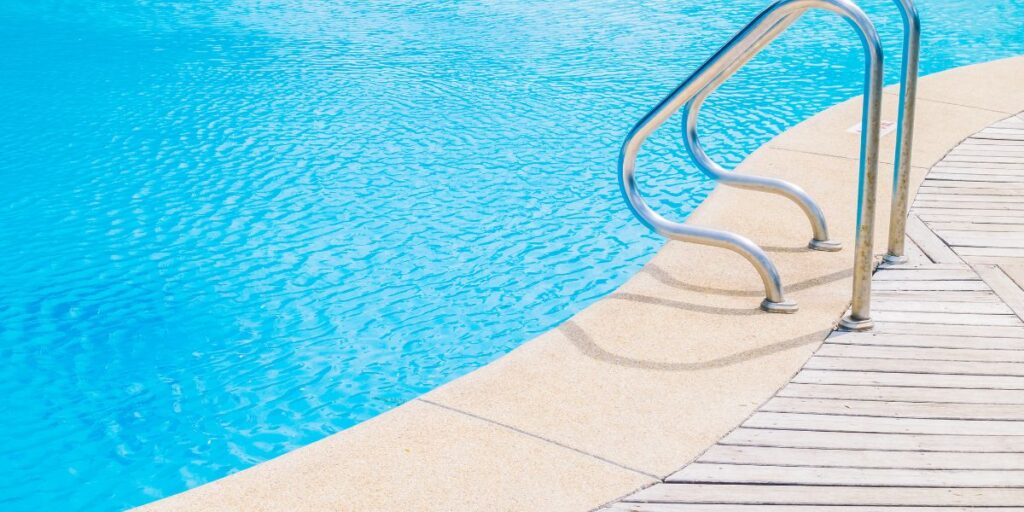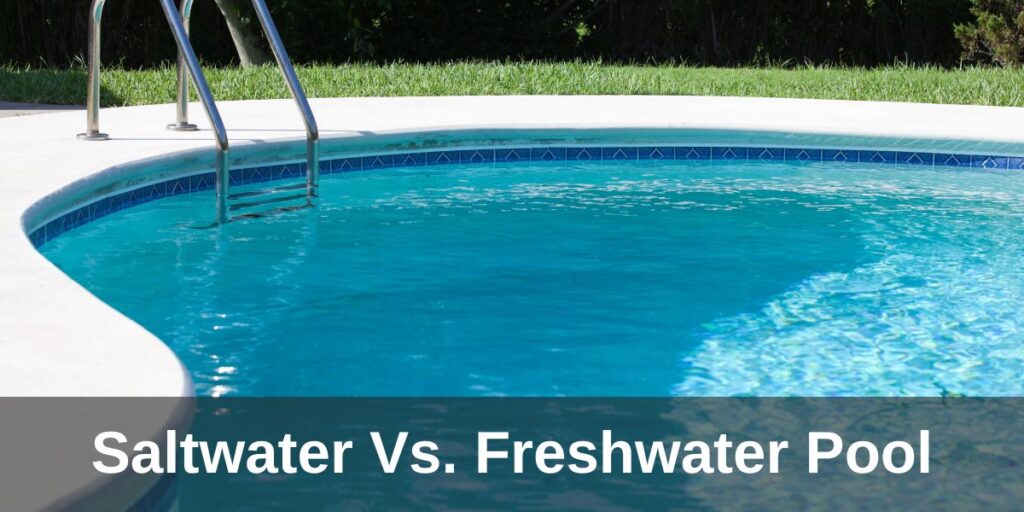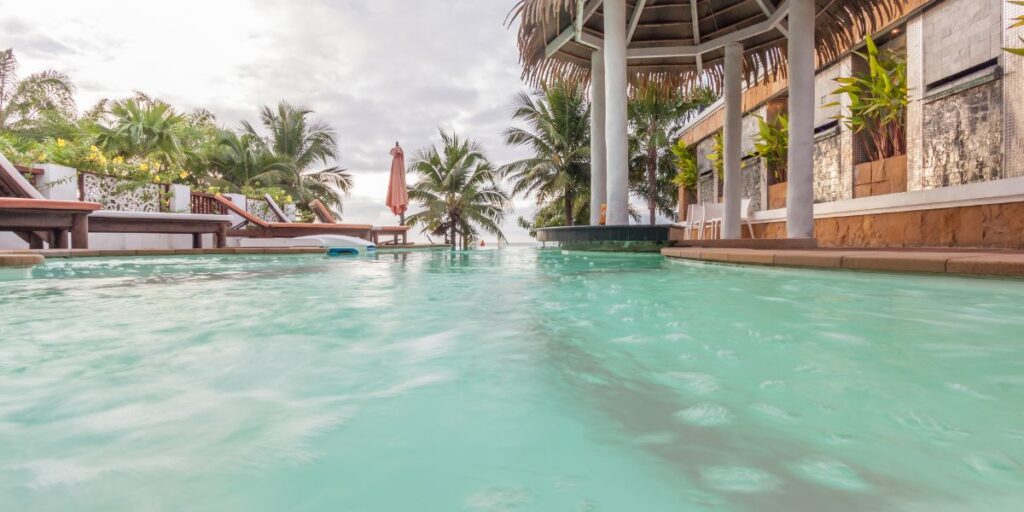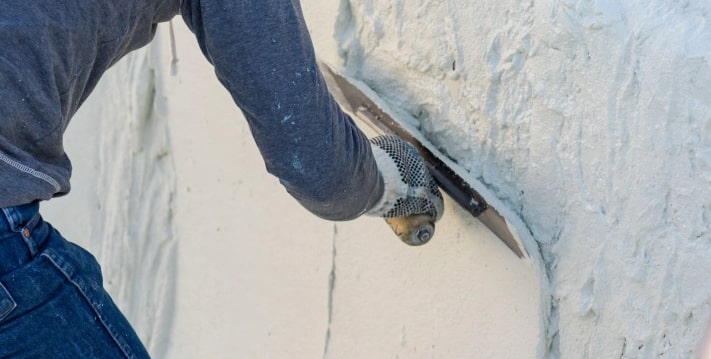Deciding between a saltwater vs. freshwater pool can be daunting for any prospective pool owner. In this blog post, we delve into the key differences between saltwater and freshwater pools, focusing on aspects such as cost, maintenance, water quality, and overall user comfort.
Understanding these differences will help you determine which pool type aligns best with your lifestyle and budget. Whether you prioritize ease of maintenance or initial investment, this comparison will guide you through choosing the perfect pool for your home. Let’s explore which is better and why, so you can make an informed decision with confidence.
Saltwater Vs. Freshwater Pool: Detailed Comparison
| Feature | Saltwater Pool | Freshwater Pool |
| #1. Initial Cost | Higher initial cost due to the need for a salt chlorine generator. | Lower initial cost as it requires standard chlorination equipment. |
| #2. Maintenance Cost | Lower maintenance costs over time; less need to buy chlorine. | Higher ongoing costs for chlorine and other chemicals. |
| #3. Maintenance Effort | Easier maintenance due to automatic chlorine generation from salt. | Requires regular manual addition of chlorine and other chemicals. |
| #4. Water Feel | Softer on the skin due to natural salt presence. | Can feel harsher on the skin and eyes due to chemical chlorine. |
| #5. Corrosion | Potential for higher corrosion on pool fixtures and equipment. | Less corrosive to pool equipment if chemicals are properly balanced. |
| #6. Health and Comfort | Generally considered healthier and more comfortable for eyes and skin. | Increased potential for eye and skin irritation from chlorine. |
| #7. Environmental Impact | Less harsh chemicals mean potentially lower environmental impact. | Higher chemical usage can have a greater environmental impact. |
| #8. Lifespan of Equipment | Can shorten the lifespan of some equipment due to salt corrosion. | Typically has less impact on equipment longevity, assuming balanced water chemistry. |
| #9. Taste of Water | Slightly salty taste, which some may find pleasant. | No taste difference compared to regular tap water, unless chemical balance is off. |
What is Saltwater Pool?
A saltwater pool operates not by using free-flowing salt water but by utilizing a salt chlorine generator. This system uses a process called electrolysis, where salt (sodium chloride) added to the pool water is converted into chlorine through electrical activation. This freshly generated chlorine sanitizes the pool, breaking down into salt, and the cycle repeats. The concentration of salt in these pools is much lower compared to ocean water, making it softer on the skin and more pleasant to swim in.
The concept of a saltwater pool is attractive because it reduces the need for manual chlorine addition, maintaining a steady level of chlorine in the water. This can lead to fewer fluctuations in sanitation levels, theoretically reducing the chances of algae and bacteria growth. Understanding this mechanism is essential when evaluating freshwater vs saltwater pool options and grasping the fundamental difference between saltwater and freshwater pool.
What is Freshwater Pool?
A freshwater pool, more commonly known as a chlorine pool, relies on the addition of chlorine directly into the water in various forms such as liquid, tablet, or granular. The chlorine acts as a disinfectant, killing pathogens and oxidizing contaminants. Unlike saltwater pools, freshwater pools require regular monitoring and adjusting of the chlorine levels to ensure the water remains safe and clean for swimming.
Freshwater pools are traditional and have been the standard for many years. The direct addition of chlorine can sometimes lead to higher levels of chloramines, which are by-products of chlorine and organic matter interactions. These are often responsible for the typical chlorine smell and can cause eye and skin irritation, as well as respiratory issues in sensitive individuals. Discussing fresh water pool vs salt water pool often involves addressing these concerns.
Difference between Saltwater and Freshwater Pool
Installation and Initial Costs
One of the primary considerations when comparing freshwater vs saltwater pool options is the cost of installation. Typically, the initial cost of setting up a saltwater pool is higher than that of a freshwater pool. This is due to the need for a salt chlorine generator, which is an essential component of saltwater systems. The generator uses electrolysis to convert salt into chlorine, thus sanitizing the pool.
While the upfront cost can be steep, ranging from a few hundred to over a thousand dollars for the generator, this investment can pay off in the long run with reduced chemical costs. On the other hand, freshwater pools require a simpler setup with traditional chlorine sanitation systems, making the initial installation less expensive but potentially more costly over time due to ongoing chemical purchases.
Maintenance and Ongoing Costs
When discussing fresh water pool vs salt water pool, maintenance, and ongoing costs are crucial. Saltwater pools are often praised for their ease of maintenance. The salt chlorine generator continuously produces chlorine, ensuring the pool remains sanitized without the frequent chemical balancing required in freshwater pools. This can lead to lower ongoing costs for chemicals.
However, saltwater systems still require monitoring and occasional adjustment of salt levels, and the salt cells in the generator need replacement every 3 to 5 years, which can be a significant expense. Freshwater pools, while requiring more regular chemical adjustments, do not involve the complexity of managing a saltwater generator, which some pool owners prefer for its straightforwardness.
Health and Comfort
Health and comfort are significant when evaluating which is better saltwater or freshwater pool. Saltwater pools are generally considered more gentle on the skin and eyes. The salt naturally produces a soft, silky feel in the water, which is less harsh than chlorine tablets used in freshwater pools. This can reduce the incidence of skin irritation and red eyes typically associated with heavily chlorinated water.
Furthermore, saltwater pools do not produce chloramines as traditional chlorine pools do, which are often the cause of the strong chlorine smell and can aggravate allergies and asthma.
Environmental Impact
The difference between saltwater and freshwater pool extends into their environmental impact. Saltwater pools have a smaller environmental footprint in terms of chemical use. The continuous generation of chlorine from natural salt minimizes the need for chemical additives, which are often accompanied by hazardous byproducts.
However, it’s important to note that saltwater pools can pose risks to landscaping and local ecosystems if not properly managed, as excessive salt can be harmful to plants and soil.
Durability and Longevity of Pool Equipment
Saltwater can be corrosive, which means that components of saltwater pools, such as heaters, pumps, and even pool linings, may degrade faster unless specifically designed to be salt-resistant. This could lead to higher replacement costs over the pool’s lifespan.
Freshwater pools might not pose the same level of corrosion risk, but the chemical fluctuations can also wear out equipment over time. Each pool type requires careful management to maximize the longevity of its components, a vital factor in deciding fresh water pool vs salt water pool.

Pros and Cons of Saltwater Pools
Pros:
- Gentler on Skin and Eyes: Saltwater pools are gentler on the skin and eyes compared to chlorine pools. The saltwater system naturally produces chlorine at lower, but effective levels, which reduces the typical discomfort associated with chlorine, such as red eyes and itchy skin.
- Lower Maintenance: These pools require less routine maintenance because they have a saltwater generator that continuously converts salt into chlorine. This means you spend less time balancing chemicals and more time enjoying the pool.
- Long-term Cost Savings: Although the initial setup cost of a saltwater system is higher, the ongoing costs for chemicals are generally lower than those for freshwater pools.
Cons:
- Higher Initial Investment: The cost of installing a saltwater system can be significantly higher than a traditional chlorine system.
- Corrosive Effects: Salt can be corrosive to certain materials used in pool fixtures and accessories, potentially shortening their lifespan.
- Complex System: The saltwater chlorination system can be complex and expensive to repair when issues arise.
Pros and Cons of Freshwater Pools
Pros:
- Lower Initial Cost: Freshwater pools are typically cheaper to install than saltwater pools, making them more accessible to a wider range of homeowners.
- Simplicity: These pools are straightforward in terms of management and maintenance, with well-understood requirements for chemical balancing.
- Flexibility with Chemicals: Owners have more control over the type and amount of chemicals used, which can be advantageous for those with specific health concerns.
Cons:
- Regular Chemical Maintenance: Freshwater pools require frequent chemical adjustments and more hands-on maintenance to ensure a clean and safe swimming environment.
- Higher Chemical Costs: Ongoing costs for chemicals can add up, making it more expensive over time compared to saltwater pools.
- Harsher on Skin and Eyes: The higher levels of chlorine needed in freshwater pools can be harsher on swimmers’ skin and eyes, leading to discomfort.
How to Pick the Right Water for Your Pool?
Choosing the right water for your pool involves considering maintenance, skin sensitivity, and environmental impact. Saltwater pools are gentler on the skin and eyes, using a salt chlorine generator to naturally produce chlorine, reducing the need for chemical additives. They offer a softer feel and are generally more cost-effective over time.
Conversely, freshwater pools are more traditional, requiring regular chlorine addition to keep the water clean and safe. They are initially less expensive to install but may require more chemicals and maintenance. Assess your long-term commitment and personal preferences to make the best choice for your home.
Conclusion
The decision between a fresh water pool vs salt water pool involves a careful evaluation of the differences and personal preferences. Whether you lean towards a saltwater pool for its ease of maintenance and gentle nature on the skin or prefer a freshwater pool for its cost-effectiveness and simplicity, the choice is highly personal and should be made based on detailed consideration of the factors discussed.
Cutters Pools: Call Our Pool Professionals Today!
If you considering a new pool or a transition from freshwater to saltwater, contact Cutters Pools, the best pool builder in Austin. Our experts will guide you through every step, from design to installation, ensuring you make the best choice for your home and family.
Frequently Asked Questions
What is the downside of salt water pool?
The main downside of a saltwater pool is its high initial setup and maintenance costs. Additionally, the salt can corrode pool components and nearby structures, and maintaining the correct salt levels requires careful monitoring to ensure water balance and equipment functionality.
Is a saltwater pool better than freshwater?
Saltwater pools are often considered better than freshwater pools due to their gentler feel on the skin and eyes. They require less chemical handling, as the saltwater system naturally produces chlorine. However, the choice depends on personal preference and considerations of maintenance costs and equipment durability.
Are saltwater pools more sanitary?
Saltwater pools are generally as sanitary as freshwater pools because both use chlorine to kill bacteria and algae. However, saltwater pools continuously generate chlorine at a steady rate, which can maintain more consistent disinfection levels, potentially making them more effective at keeping the water clean with less chemical fluctuation.
Which is easier to maintain saltwater or freshwater pools?
Saltwater pools are typically easier to maintain than freshwater pools. They automate chlorine production, reducing the need for frequent chemical additions. This steady chlorine generation helps maintain stable water quality, decreasing the likelihood of algae and bacteria blooms, thus simplifying overall pool maintenance tasks.



